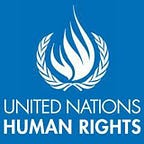“Anti-blackness is global”: An interview with Opal Tometi, Black Lives Matter
Excerpt from an interview with Opal Tometi, co-founder of Black Lives Matter, with the UN Human Rights Office. Black Lives Matter is an international activist movement that campaigns to promote and protect human rights and dignity of Black people. Opal talked about why international human rights mechanisms are important in the fight against racism.
1. Why are you at the United Nations Office of Human Rights in Geneva today?
Today, I’m here as a member of civil society participating in the 20th session of the UN Working Group of Experts for People of African Descent on challenges impacting Black people around the globe. I traveled to Geneva because I want to figure out a way for us to collaborate across the globe on social justice and human rights.
I believe that our communities can benefit if they know about and participate in the UN’s various human rights forums. The international framework of human rights law can help us address some of the core problems in US society — such as impunity for police killings of black people — which the national framework of civil rights law does not adequately address. And anti-blackness is global. Structural racism impacts Black people and their quality of life and freedoms everywhere. So, it’s important to strengthen solidarity with movements and members of civil society in these types of international spaces.
2. How can your movement benefit from the UN mechanisms that deal with racism?
To me and to a number of other activists from the US, we believe that the human rights movement has to evolve and understand the global implications of structural racism. This means engaging the United Nations and a variety of other human rights bodies.
The reality is that anti-black racism is everywhere– globalized in large part by the legacy of the enslavement of people of African descent, the colonial legacy and the current neo-colonial relations.
We have to address the real facts — and we have overwhelming amount of reports, data, stories that illustrate the fact that Black people are experiencing a range of disparate outcomes in every sector of our society in every geographic context. This is not one country’s issue, but literally a global occurrence.
There are many important tools and resources that the United Nations has that can be of use to affirm and support oppressed communities. One that is of particular relevance to the communities I work with is the Committee on the Elimination of Racial Discrimination (CERD), which oversees the implementation of the human rights convention against racial discrimination. It’s meaningful to know that there is a body and robust set of documents and mechanisms that unanimously have concluded that racism is a human rights violation.
3. What are the practical ways for people everywhere to stand up for human rights everywhere? How can people take action?
People can stand up for human rights everywhere by addressing systemic racism in their own context. If people take the fight for justice seriously in their own country and with partners and immigrants in their community and folks in the international community, I believe that we will see human rights for all people affirmed. I want to encourage our brothers and sisters to engage more effectively with these great set of human rights international tools that reaffirm our rights so profoundly.
The reality is that anti-black racism is a global phenomenon and it looks different in each context, but if you look at the outcomes, if you listen and look at the experiences, you will see that it’s clear and it’s happening across the globe. In Brazil we are seeing more unarmed black people being murdered by law enforcement. In places like France, there are thousands of homeless Black asylum seekers from Africa forced to create their own refugee camp under bridges in Paris. They don’t have sanitation, nor food. People get kicked out. This is an example of racial injustice. Black people are being brutalized in Asia and many other places around the world. For example, in Kuwait, an Ethiopian domestic worker was thrown out of the window of a seventh floor building. The plight of Black people around the globe is horrifying and we have to do all we can to end it once and for all.
“The reality is we are here. This is our skin color. This is who we are, and we are beautiful. We need a world that respects our humanity, our inherent human dignity. That world can’t come soon enough.”
You can read the Opal’s full interview on the UN Human Rights Office Stand Up campaign website.
